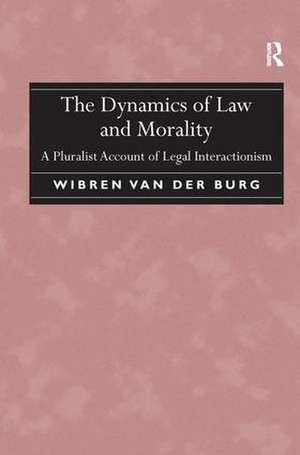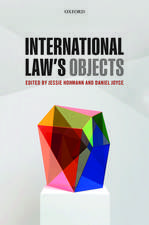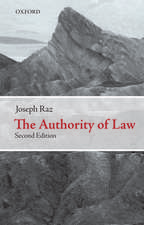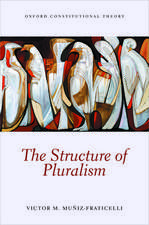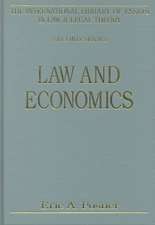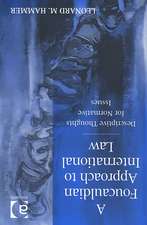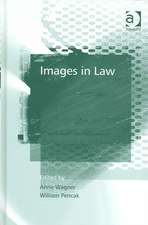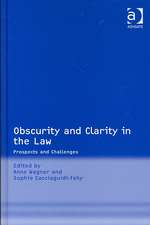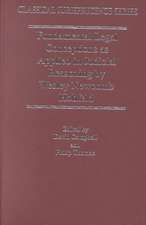The Dynamics of Law and Morality: A Pluralist Account of Legal Interactionism
Autor Wibren van der Burgen Limba Engleză Paperback – 26 aug 2016
| Toate formatele și edițiile | Preț | Express |
|---|---|---|
| Paperback (1) | 338.33 lei 6-8 săpt. | |
| Taylor & Francis – 26 aug 2016 | 338.33 lei 6-8 săpt. | |
| Hardback (1) | 821.29 lei 6-8 săpt. | |
| Taylor & Francis – 9 mai 2014 | 821.29 lei 6-8 săpt. |
Preț: 338.33 lei
Nou
Puncte Express: 507
Preț estimativ în valută:
64.74€ • 67.77$ • 53.57£
64.74€ • 67.77$ • 53.57£
Carte tipărită la comandă
Livrare economică 05-19 aprilie
Preluare comenzi: 021 569.72.76
Specificații
ISBN-13: 9781138246126
ISBN-10: 1138246123
Pagini: 200
Dimensiuni: 156 x 234 mm
Greutate: 0.45 kg
Ediția:1
Editura: Taylor & Francis
Colecția Routledge
Locul publicării:Oxford, United Kingdom
ISBN-10: 1138246123
Pagini: 200
Dimensiuni: 156 x 234 mm
Greutate: 0.45 kg
Ediția:1
Editura: Taylor & Francis
Colecția Routledge
Locul publicării:Oxford, United Kingdom
Notă biografică
Wibren van der Burg is Professor of Legal Philosophy at Erasmus University Rotterdam, the Netherlands. He has published extensively in English, German and Dutch.
Recenzii
’How should legal philosophy respond to a world of legal pluralism, relative partial authorities, and horizontal interactions among state, non-state, international, and transnational normative communities? Wibren van der Burg’s thoughtful new work articulates an emerging 21st century legal philosophy that eschews dogmatic definitions of what law is and instead melds theory and practice to focus on the key concept of interaction.’
Paul Schiff Berman, The George Washington University Law School, USA
’A tour de force. With great clarity and imagination van der Burg breaks out from the impasse of current philosophical debates on the relations of law and morality. Here at last is a book that roots legal philosophy firmly in the complex pluralism of the real world of law.’
Roger Cotterrell, Queen Mary University of London, UK
’Van der Burg’s recovery and development of legal interactionism is a fresh perspective on a host of familiar, and many novel, problems in law and legal theory. Instead of empirically unadorned attempts to discover universal attributes of law, this approach is undogmatic, indeed anti-dogmatic, pluralist, open to context, ambiguity, contingency, variation and empirical complexity. It is a rich and illuminating work.’
Martin Krygier, University of New South Wales, Australia ’
As an account of the dynamic dimensions of law, it offers a helpful balance to the often static pictures of law so prevalent in legal theory. And with its focus on non-state legal orders, and legal pluralism more generally, it offers a cutting edge view of where the next set of core questions for legal theory might lie. The book will be of significant interest to those concerned to see how non-state-centered legal theory might evolve.’
Law and Philosophy
Paul Schiff Berman, The George Washington University Law School, USA
’A tour de force. With great clarity and imagination van der Burg breaks out from the impasse of current philosophical debates on the relations of law and morality. Here at last is a book that roots legal philosophy firmly in the complex pluralism of the real world of law.’
Roger Cotterrell, Queen Mary University of London, UK
’Van der Burg’s recovery and development of legal interactionism is a fresh perspective on a host of familiar, and many novel, problems in law and legal theory. Instead of empirically unadorned attempts to discover universal attributes of law, this approach is undogmatic, indeed anti-dogmatic, pluralist, open to context, ambiguity, contingency, variation and empirical complexity. It is a rich and illuminating work.’
Martin Krygier, University of New South Wales, Australia ’
As an account of the dynamic dimensions of law, it offers a helpful balance to the often static pictures of law so prevalent in legal theory. And with its focus on non-state legal orders, and legal pluralism more generally, it offers a cutting edge view of where the next set of core questions for legal theory might lie. The book will be of significant interest to those concerned to see how non-state-centered legal theory might evolve.’
Law and Philosophy
Cuprins
Introduction; Part I Understanding Theoretical Pluralism; Chapter 1 Two Basic Models of Law and Morality; Chapter 2 Essentially Ambiguous Concepts; Chapter 3 The Debate between Fuller, Hart and Dworkin; Chapter 4 The Relations between Law and Morality; Chapter 5 A Pluralist Framework; Part II Legal Interactionism; Chapter 6 What is Legal Interactionism?; Chapter 7 Understanding the Dynamics of Law; Chapter 8 Three Apparent Anomalies in Modern Law; Chapter 9 The Necessary and Contingent Relationship between Law and Morality;
Descriere
This investigation of the dynamic intertwinement of law and morality argues that theoretical pluralism is better explained once law is accepted as an essentially ambiguous concept. The book develops a robust theory of law that increases our grasp on global legal pluralism and the dynamics of law and also emphasises the theory of legal interactionism. This helps us to understand apparent anomalies of modern law and does justice to the valuable core of truth in natural law and legal positivism.
